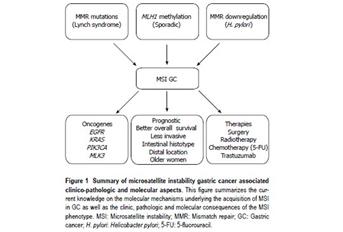Associação Portuguesa de Investigação em Cancro
Causes and consequences of microsatellite instability in gastric carcinogenesis
Causes and consequences of microsatellite instability in gastric carcinogenesis

This review summarizes the current knowledge on the molecular mechanisms underlying the acquisition of microsatellite instability (MSI) in gastric cancer (GC) as well as on the clinic, pathologic and molecular consequences of the MSI phenotype. Additionally, current therapeutic strategies for GC and their applicability in the MSI subset are also discussed.
Sérgia Velho*, Maria Sofia Fernandes*, Marina Leite, Ceu Figueiredo, Raquel Seruca
* authors contributed equally to this paper
Abstract:
Loss of DNA mismatch repair (MMR) function, due to somatic or germline epi/genetic alterations of MMR genes leads to the accumulation of numerous mutations across the genome, creating a molecular phenotype known as microsatellite instability (MSI). In gastric cancer (GC), MSI occurs in about 15% to 30% of the cases. This review summarizes the current knowledge on the molecular mechanisms underlying the acquisition of MSI in GC as well as on the clinic, pathologic and molecular consequences of the MSI phenotype. Additionally, current therapeutic strategies for GC and their applicability in the MSI subset are also discussed.
Journal: World Journal of Gastroenterology




